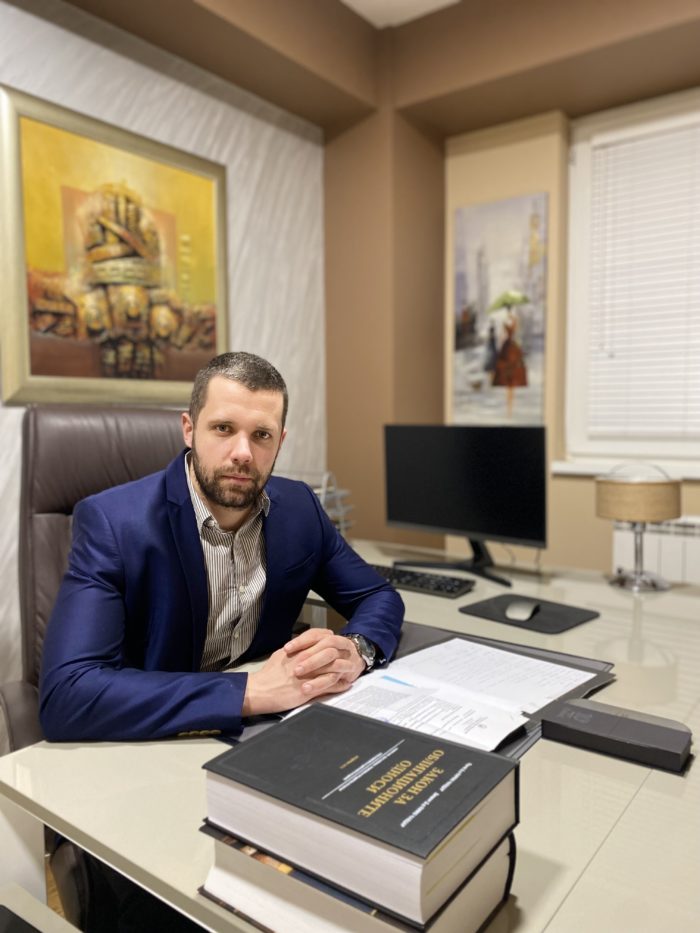Attorney-at-law Stefan Pavlovikj on young laywers’ ambitions and challenges
New pressure is imposed – the struggle to find clients, the struggle to effectively and successfully deal with the legal problems that clients have, but, for me, such pressure is an engine and a motivator for successfully dealing with the daily challenges arising from the practice of law.
Stefan, you have been an independent attorney for 8 months, but you already have a diverse experience in law. Where does the love for law come from?
When I was a child I had several wishes for my future profession, one of which was to be a military pilot or an air traffic controller, at my grandfather’s suggestion, who was an aircraft mechanic by profession. However, in the junior year of high school, we had a subject – Introduction to Law and a teacher who introduced us to the basic institutes of law in a very interesting and atypical way, and managed to attract in me a great interest in law and, naturally, in practicing law.
Can you describe the path from university to the moment of becoming a lawyer?
I have to say that the path is extremely difficult and requires enormous will and focus on the ultimate goal that one has set up for themselves. In my case, I finished the undergraduate studies on time, and then immediately I enrolled in the master studies, in the field of Substantive Criminal Law. In parallel with my master’s studies, I started volunteering at the Basic Criminal Court Skopje, where I gained a lot of knowledge thanks to the judges, who selflessly shared their knowledge and experience with me. After finishing my master’s studies, I decided to see and get to know the other side in the court – lawyer relationship by becoming an intern at the “Trifunovski, Sazdov, Cibrev” Law Firm which specializes in the field of civil law. The colleagues at the firm, especially the attorney-at-law Ivan Cibrev, , tried to convey their knowledge and experience to me in their entirety, with full and maximum dedication, as well as to prepare me for the following period and for the path that I had to follow, for which I am infinitely grateful. I was an intern in the Law Firm for approximately 2 years, until I started preparing for the bar exam, which I passed without any problem due to extensive preparation on my part. Immediately after passing the bar exam, I got a job in an international corporation as an in-house-lawyer. After a year of work for the corporation, in June 2022, I decided it was time to open my own law office.
What are the biggest challenges you faced when opening the office?
One of the biggest challenges is dealing with the initial shock and dealing with questions I asked myself: What if I don’t have enough clients? What if I make a mistake? What if I’m not ready enough for this step? How will I pay the monthly expenses? I can say that the transition period passes in a few months and you slowly get used to the new reality. However, a new pressure is imposed – the struggle to find clients, the struggle to effectively and successfully deal with the legal problems that clients have, but, for me, such pressure is an engine and a motivator for successfully dealing with the daily challenges arising from the practice of law.
Do you work alone or do you share the office with someone else?
During the period when I wanted to open my own office, I met with the former judge for organized crime Vladimir Tufegdjikj, who is one of the judges that selflessly passed on his knowledge and experience to me when I was a volunteer at the Basic Criminal Court Skopje and who, at the end of 2021, opened his own law office. He offered me collaboration – for me to be an independent attorney-at-law in his office, but to have cooperation in criminal and civil cases. I would like to express my great gratitude to him for the chance he gave me, for inviting me to be a part of his office, for giving me great support and encouragement every day to progress in the law practice and who is also a great mentor who unreservedly shares his years of experience and knowledge with me.
In which field of law do you work and want to work?
Initially, while I was a volunteer at the Basic Criminal Court Skopje, I developed great love for criminal law. Then, while I was an intern at the “Trifunovski, Sazdov, Cibrev” Law Firm, I got to know more deeply the matter of civil law. In that sense, I am currently working both in the field of criminal law and in the field of civil law.
Does modern technology make your job easier?
Especially if we draw a parallel with colleagues that worked 20-30 years ago, starting with the things we take for granted today, such as modern and fast computers, printers, scanners, access to the Internet, and then specialized applications, such as Akademika, which make our work easier, but also enable us to finish our work faster – we are now researching through various databases, documents, court decisions, papers from and about different countries in the world, all while we are sitting in the office.
What is your opinion, does our legal system easily adapt to the innovations in technology?
Like all segments in our system, in the legal system too, there are good ideas, but there is a lack of implementation. I would like to refer to the AKMIS system, which is used in the courts. It is a system of managing court cases, which at one time during its implementation was quite advanced and modern, however, for today’s standards it is an extremely slow system and it significantly slows down the work of judicial bodies, so it needs to be modernized and compliant with modern technology. Next, I would refer to the system of electronic delivery of the courts, which on paper looks like a very practical solution, but in reality it does not work at all. Currently, the system is one-way and serves for the delivery of submissions from the court to the lawyers, but in practice it is almost never used. The work would be much easier for both the judicial bodies and the lawyers if that system is two-way and if it is used daily in such a way that all submissions and documents can be delivered exclusively in electronic form, thus relieving the courts and reducing “paperwork” and this will lead to a much more efficient and concentrated management of court cases. The private sector, I can say, handles the challenges and novelties of modern technology in the field of law much better, considering that we witness new and modern electronic tools emerging every day that are of great help to lawyers, such as centralized databases of laws and by-laws, court decisions, and also tools that serve to manage the work of a modern law office.
Where and how do you see yourself in 10-20 years?
At the moment, my ambitions are to be as successful an attorney-at-law as possible and to contribute to the development and promotion of this profession, but the possibility of enrolling in the Academy of Judges and Public Prosecutors in the future and trying to make a natural transfer from being a lawyer to a prosecutor or a judge is not excluded.
Translated by: Emilija Kuzmanovska










